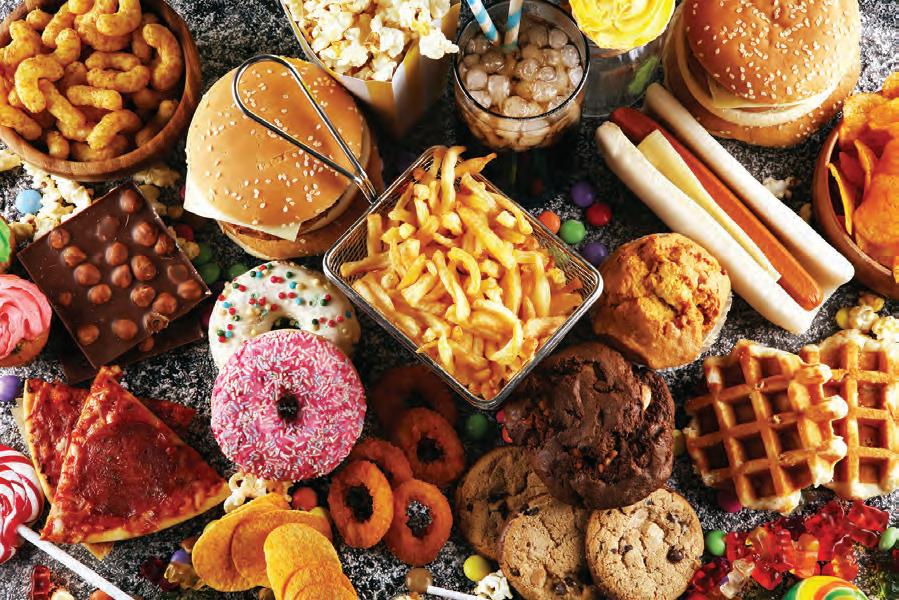
5 minute read
Cómo las pequeñas decisiones nos acercan (o alejan) de nuestras metas
Las primeras semanas del nuevo año avanzan muy rápido y muchos miran con preocupación la lista de cosas que quisieran mejorar en sus vidas, al mismo tiempo llega el recuerdo de aquellos propósitos que se hicieron el año pasado y que al final no se cumplieron. ¿Cómo le gustaría que estuviese su familia, sus finanzas, su salud?, ¿todavía queda tiempo para conquistar estas metas?
El poder de las pequeñas decisiones
El autor y empresario Jeff Olson en su libro “The Slight Edge” (traducido al español como: La ligera ventaja) nos ofrece una visión ampliamente documentada sobre cómo las pequeñas decisiones cotidianas no solo son las más importantes, sino que de ellas depende nuestro futuro. Veamos dos ejemplos.
Usted tiene sed y puede decidir entre beber un vaso de agua y un vaso de soda. Si opta por el vaso de agua, eso no significa necesariamente que su salud mejorará significativamente, solo por ese pequeño vaso. Por otro lado, si bebe el vaso de soda tampoco significa necesariamente que su salud se quebrantará, solo por ese pequeño vaso. Eso nos lleva a un punto de inflexión: Decidir por el vaso de agua es fácil, cualquiera lo puede hacer, al mismo tiempo no optar por el vaso de agua también es fácil.
Debido a que no percibimos un impacto significativo en nuestras vidas con esa pequeña decisión, pensamos que es un tema sin mayor trascendencia, pero la realidad es que, la suma de esas pequeñas decisiones, a lo largo del tiempo, es lo que va a determinar el estado de su salud. En el fondo esas pequeñas decisiones son las más importantes.
Muchos piensan que para mejorar su salud necesitan tomar medidas radicales, grandes decisiones que impactarán sus vidas, por ello es frecuente ver en enero los gimnasios atiborrados de
The first weeks of the new year are moving very fast and many are looking with concern at the list of things they would like to improve in their lives. At the same time, comes the memory of those resolutions that were made last year that were not fulfilled. What do you want to achieve for your family, your finances, and your health? Is there still time to achieve these goals?
The power of small decisions
In his book “The Slight Edge,” author and entrepreneur Jeff Olson provides an extensive synopsis of how small day-to-day decisions are not only very important, but are the decisions that determine our future. Let’s look at two examples.
Imagine that you are thirsty and you can decide between drinking a glass of water or soda. If you opt for the glass of water, that does not necessarily mean that your health will improve significantly just because of that small glass. On the other hand, if you choose the soda it does not necessarily mean that your health will be ruined. That leads us to a tipping point: deciding on the glass of water is easy-- anyone can do it-- and not choosing the glass of water is also easy.
Because we do not perceive a major impact on our lives with that small decision, we think that it does not have great significance. However, the reality is that the sum of those small decisions over time is what is going to determine the state of your health. Ultimately, the small decisions are the most important ones.
Many people think that in order to improve their health they need to take radical measures and make big decisions to impact their lives. This is why in January gyms are crammed with people with good intentions, but in May they are almost empty. Many people want to take big steps that they cannot maintain.
Diego Barahona A.
gente con buenas intenciones, pero casi vacíos en mayo. Mucha gente quiere tomar grandes saltos que luego no puede mantener.
Por el contrario, si usted se mantiene firme en las pequeñas decisiones, aquellas que no requieren gran esfuerzo, como beber agua cada vez que tiene sed, o no aceptar golosinas, o caminar todos los días, el efecto acumulativo de esas pequeñas acciones al cabo de un año le traerá enormes beneficios.
Con constancia, pequeños pasos pueden dar grandes resultados
Veamos otro ejemplo. ¿Qué tan complicado es leer 10 páginas de un buen libro al día durante sus ratos libres? Es realmente algo sencillo, cualquiera lo puede hacer. Ahora, si usted lee solamente 10 páginas esta noche no significa necesariamente que va a despertar al día siguiente como un genio. Si en su lugar prefiere pasar ese tiempo jugando con su teléfono, o contemplando la vida de los demás en las redes sociales, eso tampoco va a reducir su coeficiente intelectual. Nuevamente nos encontramos con una pequeña decisión fácil de hacer y al mismo tiempo fácil de no hacer.
¿Qué pasaría dentro de un año si lee 10 páginas diarias? Habrá leído 3,650 páginas. A un promedio de 255 páginas por libro, eso significa que habrá devorado 14 libros en 12 meses. Esos 14 libros lo pueden transformar en una persona más preparada, con un vocabulario más extenso, mejor informada, con mayor ventaja sobre sus compañeros o colegas.
¿Cómo le gustaría que estuviese su familia, sus fianzas, o su salud en un año? Tenga clara esta imagen en su mente y luego contrástela con las pequeñas decisiones cotidianas. Pregúntese ¿esta pequeña decisión me aleja o me acerca a mi objetivo? Use este principio como un filtro para su toma de decisiones.
Diego Barahona A.
Conversely, if you stick to small decisions that do not require great effort, such as drinking water every time you are thirsty, or turning down junk food, or walking every day, the cumulative effect of those small actions will bring you huge benefits by the end of the year.
With perseverance, small steps can bring big results
How difficult is it to read 10 pages of a good book during your free time each day? It is really something simple that anyone can do. Now, if you read only 10 pages tonight, it does not mean that you will wake up a genius tomorrow. If instead you prefer to spend that time playing on your phone, or poring over other people’s lives on social networks, that is not going to reduce your IQ. Once again, we find a small action that is easy to do and at the same time easy not to do.
What would happen in a year if you read 10 pages a day? You would have read 3,650 pages. At an average of 255 pages per book, that means you would have read 14 books in 12 months. Those 14 books can transform you into a more informed and knowledgeable person, with a more extensive vocabulary and with a greater advantage over your colleagues and peers. I am personally practicing this principle with reading, and the number of books I read per week has increased significantly.
Consider again what you want to achieve for your family, your finances, and your health in a year from now. Keep this image clear in your mind and then relate it to the small, everyday decisions that you make. Ask yourself: does this small decision push me away or bring me closer to reaching my goal? Use this principle to guide your decision-making.










